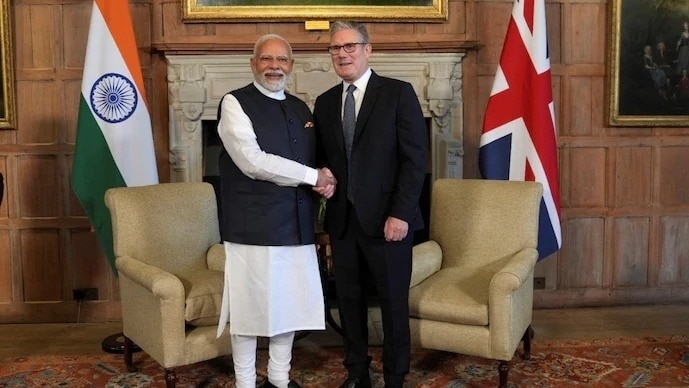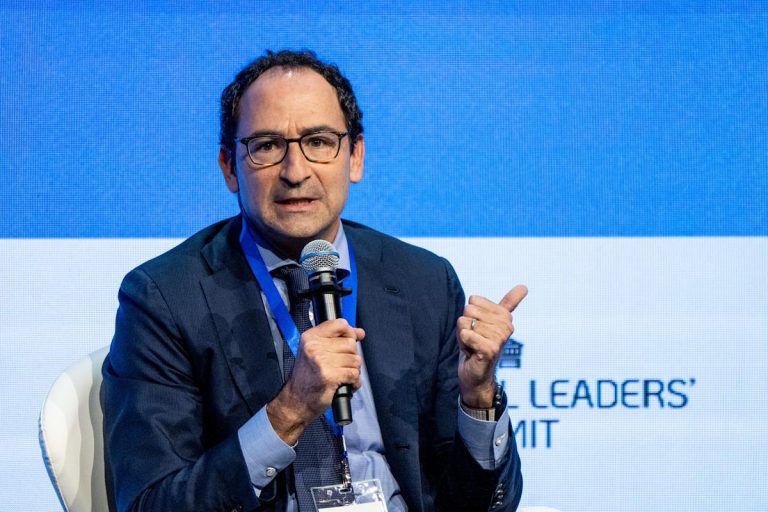India and the UK on Thursday finally signed a free trade agreement (FTA) on Thursday after years of negotiations that is expected to not only result in cheaper goods for consumers but also create opportunities for jobs and investments in both countries.
Officially called the Comprehensive Economic Trade Agreement, the FTA was concluded in May and was signed by Commerce and Industry Minister Piyush Goyal and his British counterpart Jonathan Reynolds on Thursday in the presence of Prime Minister Narendra Modi and UK PM Keir Starmer.
The bilateral trade between the two countries stands at nearly $56 billion, with a joint goal to double this figure by 2030. It also supports India’s broader target of achieving $250 billion in engineering exports by 2030.
Impact on goods:
“CETA secures unprecedented duty-free access for 99% of India’s exports to the UK, covering nearly the entire trade basket,” said an official statement, adding that this is expected to open new opportunities for labour-intensive industries such as textiles, marine products, leather, footwear, sports goods, toys, and gems and jewellery, alongside fast-growing sectors like engineering goods, auto components, and organic chemicals. The services sector, a strong driver of India’s economy, will also see wide-ranging benefits.
Zero duty on major sectors will be available to Indian exports. For instance, at present there is a 12% duty on textiles and clothing, 8% on chemicals and 10% on base metals. Medical devices and instruments will be exported to the UK at zero tariffs, helping Indian manufacturers of surgical and diagnostic equipment. Indian professionals will be exempt from UK social security payments for three years.
India has also fully protected sensitive sectors like dairy, vegetables, apples, cooking oils, oats, an issue which has proved to be a key sticking point in India’s negotiations for a bilateral trade pact with the US.
Several industries in the UK will also benefit. Tariffs on aerospace, which are as high as 11%, will now be 0%, on automotive it is down from 110% to 10% under a quota, and for electrical machinery it will be reduced from up to 22% to either 0% or a 50% reduction. In the automotive sector, conventional vehicles and auto components will get duty-free access. Electric, hybrid, and plug-in vehicles will be allowed limited concessional access under Tariff Rate Quotas.
“The signing of the Comprehensive Economic and Trade Agreement (CETA) reflects our shared commitment to enhancing trade, driving inclusive growth and creating opportunities for farmers, women, youth, MSMEs, and professionals,” PM Modi said on X.
“Today, the Prime Minister will welcome nearly £6 billion in new investment and export wins, which will create over 2,200 British jobs across the country as Indian firms expand their operations in the UK and British companies secure new business opportunities in India. These deals will drive jobs in high-growth sectors like aerospace, technology and advanced manufacturing – supporting engineers, technicians and supply chain workers, in every corner of the UK,” said a statement by the UK government.
Impact on industry:
Over the past five years, India has maintained a positive trade balance with the UK, which remains a key trading partner. Currently, more than 970 Indian companies operate in the UK, contributing approximately £1.17 billion in corporation tax and providing employment to around 1.1 million people, playing a vital role in supporting local economies and livelihoods, noted a statement by industry body CII.
“Once implemented, the India–UK FTA is expected to reduce trade barriers, enhance investor confidence, and promote joint ventures and technology transfers, especially in labour intensive sectors like textiles and apparel, leather and leather goods, gems and jewellery, marine products, besides others,” it said, adding that it will also provide a strong framework for unlocking new opportunities in clean energy, digital technologies, life sciences, and advanced manufacturing.
Chandrajit Banerjee, Director General of CII said the FTA creates a strong foundation for deeper market access, regulatory cooperation, and next-generation partnerships between Indian and UK businesses.
Pallavi Bakhru, Partner and UK Corridor Leader, Grant Thornton Bharat noted that by unlocking £25.5 billion in annual trade, the agreement will catalyse job creation across textiles, engineering, pharmaceuticals, and clean energy. “The inclusion of professional services and mutual recognition of qualifications will also accelerate high-skilled employment, especially in IT, finance, and design,” she further said.







